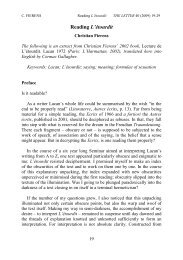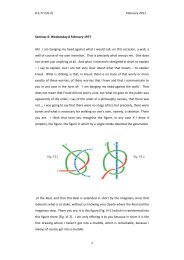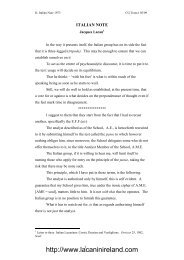I imag<strong>in</strong>e that after this second and third moment where the subject and theOther cont<strong>in</strong>ue their paths side by side always separated by the separat<strong>in</strong>gsmall o, what is the position with respect to our start<strong>in</strong>g po<strong>in</strong>t, where havewe got to? Well then, the po<strong>in</strong>t, one could say, on to which the subjectemerges, is that after this second and third moment, he has found theassurance that this little separat<strong>in</strong>g o, he has found the assurance that it waseffectively impossible to encounter it, s<strong>in</strong>ce he only managed to go aroundit, but he had needed to make several dialectical movements <strong>in</strong> order tohave, I would say, like – I don’t know if this is the right word – to have as itwere a k<strong>in</strong>d of certa<strong>in</strong>ty that is go<strong>in</strong>g perhaps to allow him to make a newleap, which will be my fourth moment, a new leap that is go<strong>in</strong>g to allow himat that moment to pass to a new k<strong>in</strong>d of enjoyment, to risk himself <strong>in</strong> it. Isaid ‘s’y risquer’ because it is not obvious that one will arrive at what I amcall<strong>in</strong>g this fourth moment that I will all the same mark. I am tell<strong>in</strong>g youthat one can imag<strong>in</strong>e a last moment which would be the term<strong>in</strong>al po<strong>in</strong>t, thepo<strong>in</strong>t not of return, s<strong>in</strong>ce the drive does not come back to the start<strong>in</strong>g po<strong>in</strong>t,but the ultimate, possible po<strong>in</strong>t of the drive, I marked the enjoyment of theOther, and the little schema, the new schema of separation, the third that Iam <strong>in</strong>scrib<strong>in</strong>g, represents the schema of separation, no longer with the littleo-object <strong>in</strong> the lunula, but with the signifier S(Ø), and the signifier S 2 , asignifier that <strong>Lacan</strong> teaches us to situate as be<strong>in</strong>g that of the Urverdrängung.Why am I mark<strong>in</strong>g that? I would say that, the whole journey hav<strong>in</strong>g beenmade, that it is from the po<strong>in</strong>t of view of the subject, of the Other and ofsecond other, it is confirmed that the object is really volatilised; one mayimag<strong>in</strong>e that at this moment the subject is go<strong>in</strong>g to make a leap, is no longergo<strong>in</strong>g to be content to be separated from the Other by the little o-object butis go<strong>in</strong>g to veritably proceed to an attempt to go through the phantasy; thereis a passage <strong>in</strong> sem<strong>in</strong>ar II, well before <strong>Lacan</strong> speaks about the problem ofthe enjoyment of the Other, where <strong>Lacan</strong> on the subject of the drive and ofsublimation, asks the question, he asks himself how the drive is experiencedafter the phantasy has been gone through. And <strong>Lacan</strong> adds: ‘It is no longerof the doma<strong>in</strong> of analysis, but is the beyond of analysis’. Now if we recall38
that the little o-object is not uniquely, as one so often hears it said,essentially characterised by the fact that it is the miss<strong>in</strong>g object, it iscerta<strong>in</strong>ly the miss<strong>in</strong>g object, but its function of be<strong>in</strong>g the miss<strong>in</strong>g object isspecified very particularly, let us say, <strong>in</strong> the phenomenon of anxiety butbesides this function, one could say that its fundamental function is muchmore rather to fill <strong>in</strong> this radical gap which renders so imperious thenecessity of demand. If there is really someth<strong>in</strong>g lack<strong>in</strong>g <strong>in</strong> this speak<strong>in</strong>gbe<strong>in</strong>g, it is not the little o-object, it is this gap <strong>in</strong> the Other which isarticulated with the S of Ø. That is why at the end of this <strong>in</strong>st<strong>in</strong>ctual circuit,to account for the experience of the listener, I am putt<strong>in</strong>g forward the ideathe nature of the enjoyment to which one can accede at the end of thejourney is not at all on the side of a ‘surplus enjoy<strong>in</strong>g’, but precisely on theside of this experience of this enjoyment, that perhaps one might call‘ecstatic’, enjoyment of existence itself – moreover as regards the term‘ecstatic enjoyment’ I was struck at f<strong>in</strong>d<strong>in</strong>g Levi-Strauss writ<strong>in</strong>g on the onehand, <strong>in</strong> a number of Musique en jeu where Levi-Strauss puts very precisely<strong>in</strong> perspective the nature, not of the enjoyment, <strong>in</strong> fact the experience ofmusic and that which appears to him to be that of mystical experience.Freud himself, <strong>in</strong> a letter to Roma<strong>in</strong> Rolland, f<strong>in</strong>ds himself answer<strong>in</strong>g,spontaneously articulat<strong>in</strong>g that he refused himself musical enjoyment andthat this musical enjoyment appeared to him as strange as what Roma<strong>in</strong>Rolland was say<strong>in</strong>g to him about enjoyments of a mystical order; anyway itis he himself who articulated the two, who had the idea of <strong>in</strong>troduc<strong>in</strong>g music<strong>in</strong>to it.<strong>F<strong>in</strong>al</strong> moment then, where the subject will make the leap, I don’t knowwhether one can say ‘beyond’ or ‘beh<strong>in</strong>d’ the little o-object, but willmanage to break through and arrive at this locus, one might say of thecommemoration of the unconscious be<strong>in</strong>g as such, namely, the jo<strong>in</strong><strong>in</strong>g up ofthe most radical lacks which are those which constitute the gap of thesubject of the unconscious and that of the unconscious, namely, to put theexperience of this..., one might say that <strong>in</strong> the f<strong>in</strong>al moment, if you wish,one might say that the real as impossible is a white heat, is raised to<strong>in</strong>candescence; at that very moment, I mean, I would <strong>in</strong>dicate, for my part,39
- Page 1: Seminar 1: Wednesday 16 November 19
- Page 5 and 6: after all noticed that to consist m
- Page 7 and 8: It would be enough for you to take
- Page 9 and 10: There had therefore been a turning
- Page 11: Supposing that we have a torus in a
- Page 15 and 16: topology encourages us to do so. Th
- Page 17 and 18: and me, and I who, in short, by din
- Page 19 and 20: we cut it in two, the front and the
- Page 21 and 22: is itself a hole and in a certain w
- Page 23 and 24: Everyone knows that this is how thi
- Page 25 and 26: Seminar 3: Wednesday 21 December 19
- Page 27 and 28: proceed to this double cut, a doubl
- Page 29 and 30: The inside and the outside in this
- Page 31 and 32: egards the structure of the body, o
- Page 33 and 34: inspired by it and its inspiration,
- Page 35 and 36: music on you, is that it has this p
- Page 37: from the beloved to the lover. What
- Page 41 and 42: Seminar 4: Wednesday 11 January 197
- Page 43 and 44: short I called the discourses; the
- Page 45 and 46: It is flattened out, and in a way t
- Page 47 and 48: astonishes me still more, is not th
- Page 49 and 50: Seminar 5: Wednesday 18 January 197
- Page 51 and 52: see it here, namely, something that
- Page 53 and 54: namely, that everything that concer
- Page 55 and 56: Let’s see. Let us try to see here
- Page 57 and 58: - X: You can’t hear me because pr
- Page 59 and 60: Seminar 6: Wednesday 8 February 197
- Page 61 and 62: its relationship to the body that w
- Page 63 and 64: that in the position B1, would be t
- Page 65 and 66: is in the position of maintaining t
- Page 67 and 68: Effectively the problem of primary
- Page 69 and 70: which I will return later, what is
- Page 71 and 72: the object of desire is not unknown
- Page 73 and 74: that he tells the truth. You see th
- Page 75 and 76: look of the Real, there is not, for
- Page 77 and 78: accentuated by him is the search fo
- Page 79 and 80: What is happening, is it not, the d
- Page 81: grounded and articulatable way, and
- Page 84 and 85: eason is said to be purloined, whil
- Page 86 and 87: Borromean knot with that of the Ima
- Page 88 and 89:
Alain Didier Weill, for his part, i
- Page 90 and 91:
Seminar 8: Wednesday 8 March 1977Wh
- Page 92 and 93:
shouldn’t tell you, at 7.15 at Ju
- Page 94 and 95:
means that the tongue fails, that,
- Page 96 and 97:
of his time as a formidable cleric
- Page 98 and 99:
It is very difficult not to waver o
- Page 100 and 101:
I remind you that the place of semb
- Page 102 and 103:
this term in the feminine, since th
- Page 104 and 105:
which coincides with my experience,
- Page 106 and 107:
and to put that for you in black an
- Page 108 and 109:
see, does not see too great an inco
- Page 110 and 111:
that exists, he says what he believ
- Page 112 and 113:
In short, one must all the same rai
- Page 114 and 115:
particular besides, neurotic, a sex
- Page 116 and 117:
functioning as something else. And
- Page 118 and 119:
mean to deny? What can one deny? Th
- Page 120 and 121:
slipping from word to word, and thi
- Page 122 and 123:
Seminar 12: 17 May 1977People in th
- Page 124 and 125:
y writing. And writing only produce
- Page 126 and 127:
not pinpointed it? He calls this a














